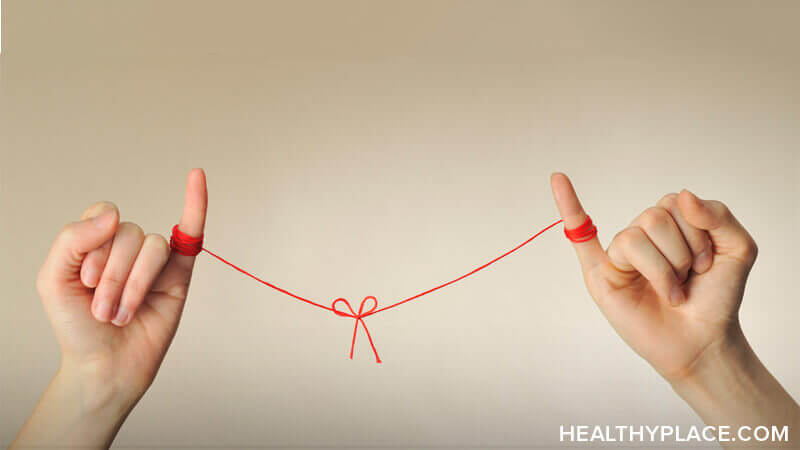Recognizing Codependency in Our Relationships

Codependency was a term I remember hearing as a teen but didn’t understand. What is the difference between offering and relying on support from a loved one in times of need and being codependent with that person? I’ve seen people in my life slip into this unhealthy relationship pattern, and I understand now just how mental illness and trauma create the perfect environment for codependency to grow.
What Is Codependency?
Codependency refers to an over-reliance on someone else, whether it be in a romantic relationship, friendship, or family. It is when one person in a relationship acts as the giver or the enabler and takes on too much responsibility for the other's needs at their own expense. The “taker” can’t function independently without the giver taking care of them. It becomes a cycle where one person needs the other, and the other needs to be needed.1 Codependency is a common relationship pitfall when mental illness is involved.
People in codependent relationships don't have healthy boundaries between themselves and others, and their identities become so enmeshed with the other that they lose their sense of individuality. According to Mental Health America, codependency can also be described as "relationship addiction."2 When one or both people in the relationship have a mental illness, it's all too easy to slide into codependency because there is already a reason for one person to rely too much on the other for support.3
How I Have Managed to Avoid Codependence in My Relationship
The topic of codependency came up between my partner and me this past week. There is a natural imbalance in our relationship because of my anxiety, and I seek more emotional support from him than he does from me. We could slip into codependency because of this inherent imbalance, but after eight years together, we haven't crossed into that territory. We started to talk about what we do that protects our relationship from codependency. These are some of the things we do:
- We have individual identities separate from our relationship. We are a unit made of two distinct individuals. We enjoy being together, but we can also enjoy being apart. I have my own friends and interests, and he has his.
- We don't need to ask each other for permission to do things without the other, nor is there any guilt involved in doing so. We tell each other about our plans out of consideration and because we want to, not because we have to.
- He offers me the support that empowers me to reach a place where I can help myself. He does not enable my self-defeating thoughts or behaviors by playing into them or trying to "rescue" me.
- I offer him whatever support I can, even if the type of support he needs looks very different from the support I would need in the same situation.
- He draws a clear boundary between my feelings and his, which helps me when I begin to overidentify with his emotions. We don't allow our emotions to become intertwined.
- We communicate openly about our relationship. We feel safe bringing up concerns and stating what we need from each other. We listen to and value each other's perspectives.
How Do You Know If Your Relationship Is Codependent?
My relationship has helped me find myself as an individual rather than lose my own identity, but I know many who lose themselves in their relationships or rely on a relationship to define or complete them. They also tend to struggle with the difference between codependency and care, support, and affection. If you are wondering whether your relationship is codependent, ask yourself these questions:
- Who are you without this person? Can you answer this question?
- How do you feel when you spend time apart? How do they feel?
- Does one of you always seem to be making sacrifices for the other?
- Do you make excuses for their actions even when you don't agree? Do they make excuses for you?
- Do either you or your partner use the other as their sole source of support?
- Do you feel like you can't function without them, or feel that they can't function without you?
Even though the cycle of needing and being needed can feel rewarding in the short term, codependent relationships can become abusive and make mental illness even worse by taking away your independence and identity.3
If you think your relationship might be codependent or you have these tendencies and want to avoid this type of relationship, there are plenty of resources to help. Mental health counselors can help with codependency, there is a recovery group called Codependents Anonymous, and there is information online to help you with self-reflection and building healthy habits in relationships.
For more information, check out this collection of articles on identifying, understanding, and healing from codependency. Let me know what you think in the comments.
Sources
- Berry, J., What's to Know About Codependent Relationships? Medical News Today, October 2017.
- Mental Health America, "Co-Dependency." Accessed September 26, 2021.
- Gould, W. R., "What Is Codependency? Recognizing the Signs." Verywell Mind, December 2020.
APA Reference
Sabatello, J.
(2021, September 27). Recognizing Codependency in Our Relationships, HealthyPlace. Retrieved
on 2026, March 5 from https://www.healthyplace.com/blogs/relationshipsandmentalillness/2021/9/recognizing-codependency-in-our-relationships
Author: Juliana Sabatello
Codependency is one of those things that can be so easily overlooked or simply unrealized at the start, and then it begins to grow and take root. I love your examples of how you and your partner avoid codependency. They are considerate, mindful, and easy to replicate for others in their own relationships.
